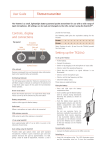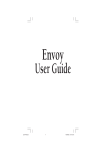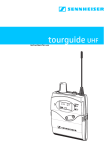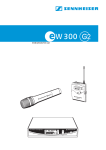Download Audio House TX2040 User guide
Transcript
2040 User Guide DX2040 portable true diversity receiver – page 3 miniTX miniature pocket transmitter – page 7 TX2040 pocket transmitter – page 14 HX2040 handheld transmitter – page 20 SwitchiR infrared remote control – page 26 Control-X transmitter controller – page 28 CHAPTER 1 Introduction The 2040 range has been designed as a result of extensive feedback from professional sound specialists and sets a new benchmark for radio microphone systems, with several unique features and offering benefits to appeal to sound mixers, directors, and artists. DX2040 . . . . . . TX2040 . . . . . . . . . . . . . . . . . . . . . . . . . . . . . . . . . . . . . . . . . . The DX2040 true diversity receiver in the RMS2040 range The TX2040 is a pocket transmitter that provides 32 pre- can be used with the TX2040 pocket transmitter and the programmed frequencies with a switching bandwidth of up HX2040 handheld transmitter. It is also fully compatible with to 24MHz. The transmitter can be switched on and off, even the TX2020 and TX2000 UHF transmitters. All settings on the when it is worn beneath clothing, using the unique Control-X DX2040 receiver can be read or changed via infra-red using handset. It is also compatible with the SwitchiR infra-red the SwitchiR or AudiR© for Palm™. controller, and AudiR™ application Palm PDA. miniTX . . . . . . HX2040 . . . . . . . . . . . . . . . . . . . . . . . . . . . . . . . . . . . . . . . . . . The miniTX transmitter is the smallest transmitter in the The HX2040 is a handheld transmitter designed in a classical Audio Ltd range. Designed as a rounded form to be very conical shape, designed to accept any of 14 condenser easily concealed. All settings can be set and changed via capsules from the Schoeps™ Colette range. the infra-red port using the SwitchiR™, and the miniTX The transmitter has 32 pre-programmed frequencies can also be turned on and off through clothing using with up to 24MHz switching bandwidth, and it includes a the Control‑X. There are two versions of the transmitter unique infra-red remote control interface for reliable and available: one with a 4-pin Lemo connector and the other accessible control over settings via the SwitchiR or AudiR™ with a 3-pin Lemo connector. application for Palm PDAs. CHAPTER 1 SwitchiR . . . . . . . . . . . . . . . . . . . . . . . . The SwitchiR is an infra-red remote control unit the size of a key fob, which can be used to access all the user-settable functions of the TX2040 and HX2040. Functions include transmitter frequency, audio level, battery status, serial number, and user identification. Control-X . . . . . . . . . . . . . . . . . . . . . . . . The Control-X uses electromagnetic induction to allow the miniTX or TX2040 transmitter to be controlled remotely, even through clothing. At a distance of up to 20cm (8") the Control-X can switch on and off the transmitter, or check and display the selected frequency, and it also provides battery check features. RK2040 . . . . . . . . . . . . . . . . . . . . . . . . The RK2040 is a compact 1U rack capable of accommodating up to four true diversity receivers. The RK2040 can be mains powered via an AC/DC adaptor, or can be powered from any 10-18V DC source. A built-in RS485 PC interface allows remote monitoring and control via Audio Ltd’s PC-based monitoring application, Racktop. CHAPTER 2 DX2040 Receiver The DX2040 true diversity receiver in the RMS2040 range can be used with the TX2040 pocket transmitter and the HX2040 handheld transmitter. It is also fully compatible with the TX2020 and TX2000 UHF transmitters. All settings on the DX2040 receiver can be read or changed via infra-red using the SwitchiR or AudiR© for Palm™. Top panel Controls, display and connections Audio output . . . . . . . . . . . . . . . . . . . . . . . . Infra-red port Antenna B Antenna A Bottom panel Battery compartment On/off switch TX low battery DX low battery No signal Identification plug Audio output Provides transformer balanced microphone level and Battery compartment adjustable headphone outputs. Holds two 1.5v AA (LR6) type cells. Antenna A and Antenna B On/Off SMA sockets to which the antennae are connected. Switches the power on or off. Additionally the output cable Indicators next to each antenna indicate which of the unit’s includes a link which disconnects power when the Lemo two built-in receivers is active at any time. plug is removed, in which case the switch can be left on. Infra-red port Identification plug Receives commands from and transmits status information Can be fitted with one of the coloured rubber plugs supplied back to the SwitchIR infra-red controller. with the DX2040 to identify each unit. DX2040 Receiver TX/DX low battery indicators Insert two 1.5 volt AA (LR6) type batteries, negative contact Illuminate when the unit detects low battery power in either first as shown on the side of the unit, and close the cover. Do the TX2040 Pocket Transmitter or DX2040 Receiver. The units not use excessive force. should not be used when a low battery power indicator is Connecting the antennae illuminated as poor operation may result. Connect the antennae to the SMA connectors marked Note: The low DX battery indicator does not function when Antenna A and Antenna B. Connect the straight antenna to the receiver is externally powered via Audio Ltd’s cables. one socket and the right-angled antenna to the other socket. This is not a fault. Selecting the operating frequency No-signal indicator You can check or change the operating frequency of the Illuminated when no carrier signal is being received, such DX2040 receiver via infra-red control using the SwitchiR. as when the transmitter is switched off or set to an incorrect To check the DX2040 frequency: frequency. • Press MENU. Setting up the DX2040 The display shows: To set up the DX2040 in conjunction with a TX2040 or HX2040: • Fit the batteries. FREQUENCY Fr MHz • Align the front of the SwitchiR with the infra-red port on • Connect the A and B antennae. the receiver and press OK. • Connect the audio output cable. Optimum operating range is between 5 and 15cm. • Slide the On/Off switch to the On position. • Select the operating frequency. The SwitchiR will display the • Set the output level. receiver frequency; for example: • Check that one of the A and B indicators is illuminated FREQUENCY 854.900 Rx MHz To change the DX2040 frequency: and that the red ‘No signal’ indicator is not illuminated. These steps are explained below: • Press OK again. Fitting the batteries The display will alternately flash between frequency and To open the battery compartment, slide the release catch channel number. towards the centre of the DX2040 and flip open the cap. DX2040 Receiver For example: 01 the display shows: the receiver and press OK. from the receiver until the required channel or frequency is displayed. The display will show the current output level setting; for example: CHANNEL 32 -07 dB Rx • Press the OK button. the receiver and press OK. The AF level display will flash. If the command was received correctly the display will show • Press the a or v button to step between the available the new frequency. output level settings until the required output level is FREQUENCY displayed. 857.950 Rx Otherwise the display will show: AF LEVEL To change the receiver output level: • Align the front of the SwitchiR with the infra-red port on For example: TxRx AF • Align the front of the SwitchiR with the infra-red port on • Press a or v to scroll through the 32 frequencies read For example: AF LEVEL • Press a once until CHANNEL MHz For example: AF LEVEL -15 dB Error TxRx • Align the front of the SwitchiR with the infra-red port on • Repeat the above steps if an error message is displayed, the receiver and press OK. moving the SwitchiR closer to the infra-red port. If the command was received correctly the new level will be Setting the output level displayed. The DX2040 output level is attenuated in 1dB steps over a For example: 32dB range, allowing the receiver output to be matched to inputs which require a lower input level. The 0dB reference AF LEVEL -15 dB TxRx level is -25dBu. Otherwise the display will show: To check the DX2040 output level: • Press MENU. Error DX2040 Receiver External powering • Repeat the above steps if an error message is displayed, moving the SwitchiR closer to the infra-red port. Audio Ltd has a large selection of cables available for a variety of different applications. If the DX2040 receiver is to Checking the DC power status be externally powered, ensure that the appropriate cable is To check the status of the receiver’s DC power: used. • Press MENU. • Press a three times until the display shows: Technical specification . . . . . . . . . . . . . . . . . . . . . . . . BAtt TxRx Frequency range 470MHz–1000MHz Number of frequencies 32 pre-programmed Switching bandwidth Up to 24MHz Sensitivity -98dBm for 40dB SINAD Balanced output level -25dBu receiver’s DC status and the received transmitter DC status. Frequency response 50Hz to 18kHz ±1dB For example: THD <0.2% typical Batteries 2 x 1.5V AA (LR6) type Battery life > 4 hours on good alkaline batteries Size 147 x 64 x 20mm Weight 250g Operating temperature range -20°C to +55°C Compliant to ETS 300422 EN 300445(CE) FCC • Align the front of the SwitchiR with the infra-red port on the receiver and press OK. The display will show the DC voltage: Rx 2.7 v If the associated transmitter is on while the DC status is being checked the display will alternate between the Tx H The transmitter status is shown as one of the following options: Option Description H (high) Indicates good. L (low) Indicates low. Replace as soon as possible. F (failed) Transmitter will not function correctly. CHAPTER 3 miniTX The miniTX transmitter is the smallest transmitter in the Audio Ltd range. Designed as a rounded form to be very easily concealed. All settings can be set and changed via the infra-red port using the SwitchiR™, and the miniTX can also be turned on and off through clothing using the Control-X. There are two versions of the transmitter available: one with a 4-pin Lemo connector and the other with a 3-pin Lemo connector. Controls, display and connections . . . . . . . . . . . . . . . . . . . . . . . Battery compartment . Holds two AAA type 1.5V alkaline batteries. Top panel Audio input socket Infra-red port Audio input Antenna Allows a microphone or input cable to be connected via a 4pin Lemo connector, or 3-pin Lemo connector on an optional variant. On/Overload (red) SMA antenna connector Sleep/Low battery (orange) SMA socket to which the antenna is connected. Infra-red port LF cut using SwitchiR Receives commands from and transmits status information Gives approximately 12dB LF cut at 50Hz, to assist in the back to the SwitchiR infra-red controller, or AudiR for Palm. reduction of wind noise. On/Overload indicator (red) Gain setting using the SwitchiR Flashes on momentarily to indicate an overload in the Provides eight gain options when used with standard presence of a high-level audio signal. At this point, the low microphones. Position 9 gives maximum gain and each distortion limiter operates. position decreases the gain by approximately 3 to 4dB, giving a total of 30dB of adjustment. Sleep/Low battery indicator (orange) Flashes every two seconds when the transmitter is in sleep mode. Remains on when the battery is low. miniTX Transmitter Setting up the miniTX . . . . . . . . . . . . . . . • Rotate the battery cover in either direction. . . . . . . . . . • Insert two AAA (LR03) type batteries as shown in the To set up the miniTX: diagram on the miniTX sleeve. • Close the battery cover and tighten the battery cover • Fit the batteries. retaining nut in a clockwise direction. Take care not to • Connect the antenna. over tighten. • Switch on by plugging in the microphone or input cable (4-pin Lemo version only). The miniTX has reverse battery protection. • Check or select the operating frequency. Low battery indication • Check that the receiver’s no signal indicator is not When the battery is low the orange LED will remain on. The illuminated. miniTX should not be used when the battery is low as poor • Check or set the microphone gain. operation may result. A low transmitter battery indicator • Check or set the LF cut filter. is also provided on the DX2040 receiver and on the RK2040 • Check the battery status. rack. These steps are explained below: Note: On the miniTX fitted with the 3-pin Lemo connector, Fitting the batteries the transmitter will switch on as soon as the batteries have • Open the battery compartment by turning the battery been fitted to the transmitter. To maximize battery life the cover retaining nut in an anti-clockwise direction. miniTX should be put into sleep mode by turning the miniTX off using the SwitchiR. Connecting the antenna • Connect the flexible antenna to the SMA connector. Switching on • Insert the microphone plug (only the 4-pin Lemo version – M turns on the miniTX). 1 9 K 8 U 0 E in C e d a + – + + The red LED illuminates momentarily under the top cover to indicate that the transmitter has been turned on. + – miniTX Transmitter Switching off To change the frequency: To turn the transmitter off remove the Lemo plug (4-pin Lemo • Press OK. version only), or put the miniTX in sleep mode by switching it off using the SwitchiR. Alternatively the miniTX can be The display will alternately flash between showing the turned off or on, even through clothing, using the Control-X. frequency and channel number. In sleep mode the orange LED will flash every two seconds For example: CHANNEL 01 and the transmitter will draw very little current. Connecting the audio input • Press a or v to scroll through the 32 frequencies read from the transmitter until the desired frequency or • Connect the microphone or input cable to the four-pin channel is displayed. Lemo socket. For example: A positive microphone bias voltage is provided, enabling the CHANNEL 32 majority of modern lavalier microphones to be used with the miniTX. • Point the SwitchiR at the infra-red port on the miniTX and Selecting the operating frequency press OK. You can check or change the operating frequency of the If the command was received successfully the display will miniTX via the infra-red control using the SwitchiR. show the new set frequency. To check the frequency: For example: • Press MENU. The display shows: FREQUENCY Tx Otherwise it will show: FREQUENCY Fr MHz 857.950 MHz Error • Repeat the above steps if an error message is displayed, • Align the front of the SwitchiR with the infra-red port on moving the SwitchiR closer to the infra-red port. the miniTX and press OK. The display shows the current FREQUENCY frequency; for example: Tx 854.900 MHz miniTX Transmitter Setting the gain If the command was received correctly the display will show The steps between gain settings 2-9 are approximately 3 the new gain setting. to 4dB. Set the gain position so that the Overload indicator For example: does not flash on during normal operation. AF LEVEL Tx Note: On the miniTX gain settings 0, 1, and 2 are the same. Otherwise the display shows: Error To check the gain setting: • Repeat the previous steps if an error message is • Press MENU followed by a. displayed, moving the SwitchiR closer to the infra-red The display will indicate: AF LEVEL TxRx port. AF Setting the LF cut filter • Align the front of the SwitchiR with the infra-red port of The LF cut filter gives an approximately 12dB cut at 50Hz to the miniTX and press OK. reduce handling and wind noise. The display will show the current transmitter gain setting: 9 AF LEVEL To check the status of the LF cut filter: Tx • Press MENU. To change the gain setting: • Press a twice until the display shows: • Press OK again. LF Cut Tx • Align the front of the SwitchiR with the infra-red port on The display will flash the level setting. the transmitter and press OK. • Press a or v to step between gain settings 2-9 until the The current LF cut filter setting required gain setting is displayed. is displayed; for example: For example: AF LEVEL Tx 9 To change the filter setting: • Press OK again. • Align the front of the SwitchiR with the infra-red port on the transmitter and press OK. The current setting will flash. 10 Tx OFF miniTX Transmitter Infra-red disable . . . . . . . . . . . • Press a or v to toggle between ON or OFF until the required setting is displayed. . . . . . . . . . . . . . You can protect the miniTX from an accidental change • Align the front of the SwitchiR with the infra-red port on of settings, such as in a live performance, by disabling the transmitter and press OK. the infra-red port on the transmitter. This will prevent all If the command was received successfully the new setting communication with the transmitter until the the battery is will be displayed. disconnected and reconnected via the microphone plug. For example: Otherwise the display will show: Disabling the infra-red port On Tx • Press MENU. • Press v twice. Error The display • Repeat the previous steps if an error message is will show: dISABLE TxRx TxRx Ir ? displayed, moving the SwitchiR closer to the infra-red • Align the front of the SwitchiR with the infra-red port on port. the transmitter and press OK. Checking the battery status If the command was received • Press MENU. successfully the display will show: • Press a three times until the display shows: BAtt subsequent interrogation of the transmitter will give an error • Align the front of the SwitchiR with the infra-red port on display; this is not a fault. the transmitter and press OK. current battery status: Tx Ir OFF Note: Once the infra-red port has been disabled, any TxRx The display will show the Tx 2.6 v The battery level can also be checked from the receiver; see the appropriate instructions for the receiver. 11 miniTX Transmitter Sleep mode . . . . . . . . The red overload LED will flash on momentarily to indicate . . . . . . . . . . . . . . . . that the miniTX has woken from sleep mode. The miniTX can be put into sleep mode using the SwitchiR. • Press MENU. In sleep mode the orange LED will flash every two seconds. The miniTX uses very little current and the SwitchiR can still The display shows: FREQUENCY Fr be used to read all settings other than frequency. When not in use the power should be switched off by • Align the front of the SwitchiR with the infra-red port on removing the microphone plug or input cable. the transmitter and press OK. Putting the miniTX into sleep mode The display shows the current FREQUENCY • Press MENU followed by v. frequency; for example: Tx The display will indicate: on again. • Align the front of the SwitchiR with the infra-red port on the transmitter and press OK. tr oFF To switch the transmitter on again: • Press MENU. The display shows: FREQUENCY Fr MHz • Align the front of the SwitchiR with the infra-red port on the transmitter and press OK. The display shows: 857.950 MHz Alternatively, you can use the Control-X to turn the miniTX OFF Tx The display will show: MHz Error 12 miniTX Transmitter Technical specification . . . . . . . . . . . . . . . . . . . . . . . . Frequency range 470MHz–1000MHz Number of frequencies 32 pre-programmed Frequency stability Better than ETS 300–422 Switching range Up to 24MHz Output power 25mW nominal RF output connector SMA 50Ω Audio input connector 4 pin Lemo™ Other variant available: 3 pin Lemo™ System frequency response 50Hz to 18kHz ±1dB System THD measured at 1kHz <0.1% at working levels <0.3% at gain position 9 with -6dB input in overload Gain control range 30dB in 8 steps Maximum input level 0dBu gain position 2 Indicators Red LED to indicate overload Flashing orange LED to indicate sleep mode Static orange LED for low battery Batteries 2 x AAA (LR03) 1.5V type alkaline Battery life Typically 5 hours with alkaline type batteries Other miniTX can be switched ON/OFF through clothing via Control-X (available separately) Size 16.5 x 82 x 48mm (DxHxW) Weight 90g inc batteries Operating temperature -20°C to +55°C Compliant to R&TTE, FCC, EN 300-422 EN 300-445 0891 13 CHAPTER 4 TX2040 Pocket Transmitter The TX2040 is a small, lightweight battery-powered pocket transmitter for use with a wide range of lapel microphones. All settings can be read and changed via the infra-red port using the SwitchiR™. Controls, display and connections . . . . . . . . . . . . . . . . . . . . . . . Battery compartment . Holds a 6LR61 type 9V alkaline battery. Top panel Audio input On (green) Overload (orange) Audio input socket Allows a microphone or input cable to be connected. Infra-red Antenna port SMA antenna connector SMA socket to which the antenna is connected. LF cut using SwitchiR Gives approximately 6dB LF cut at 50Hz, to assist in the On/Reset button reduction of wind noise. Infra-red port Gain setting using the SwitchiR Receives commands from and transmits status information Provides eight gain options when used with standard back to the SwitchiR infra-red controller. microphones. Position 9 gives maximum gain and each position decreases the gain by approximately 3 to 4dB, On/Overload indicator giving a total of 30dB of adjustment. Positions 1 and 0 The LED glows green while the TX2040 is switched on, but provide line-level input. will flash orange to indicate an overload in the presence of a high-level audio signal. At this point the low distortion limiter The following table gives the equivalent settings for the operates. TX2020: Brown reset button Resets the TX2040 and turns it on again from sleep mode. Please use the tip of the antenna to press the button. 14 TX2040 0 1 2 3 4 5 6 7 8 9 TX2020 8 9 0 1 2 3 4 5 6 7 TX2040 Pocket Transmitter Note: Positions 0 and 1 (8 and 9 on the TX2020) provide line- Do not use excessive force: level input. Setting up the TX2040 . . . . . . . . . . . . . . . . . . . . . . . . To set up the TX2040: • Fit the battery. • Connect the antenna. • Switch on by plugging in the microphone or input cable. + _ • Check or select the operating frequency. • Check that the receiver’s no signal indicator is not illuminated. • Check or set the microphone gain. An electronic resettable fuse protects the transmitter from • Check or set the low frequency cut filter. reverse powering. A low transmitter battery indicator is • Check the battery status. provided on the DX2040 receiver and on the RK2040 rack in These steps are explained below: addition to the LED indicator on the TX2040 transmitter. Fitting the battery Connecting the antenna • Press and slide open the battery compartment door. • Connect the flexible antenna to the SMA connector. • Insert a 6LR61 type 9V alkaline battery with its contacts Switching on facing downwards observing the polarity as shown on the • Insert the microphone plug. sleeve. • Push the battery down against the spring-loaded contacts The LED illuminates green and the transmitter turns on. To and slide the battery compartment door closed, pushing turn the transmitter off remove the lemo plug. Alternatively against the spring-loaded contacts. the TX2040 can be turned off or on, even through clothing, using the Control-X. 15 TX2040 Pocket Transmitter The LED flashes green when the battery voltage falls below The display will alternately flash between showing the 6.5V. The unit should not be used when the battery is low as frequency and channel number. poor operation may result. For example: CHANNEL 01 Connecting the audio input • Connect the microphone or input cable to the six-pin • Press a or v to scroll through the 32 frequencies read Lemo socket. from the transmitter until the desired frequency or Both positive and negative microphone bias voltages are channel is displayed. provided, enabling the majority of Lavalier microphones to For example: be used with the TX2040. 32 Selecting the operating frequency • Point the SwitchiR at the infra-red port on the TX2040 and You can check or change the operating frequency of the press OK. TX2040 via the infra-red control using the SwitchiR. If the command was received successfully the display will To check the frequency: show the new set frequency. • Press MENU. The display shows: CHANNEL For example: FREQUENCY Fr FREQUENCY Tx MHz Otherwise it will show: • Align the front of the SwitchiR with the infra-red port on the TX2040 and press OK. 857.950 MHz Error • Repeat the above steps if an error message is displayed, The display shows the current FREQUENCY frequency; for example: Tx moving the SwitchiR closer to the infra-red port. 854.900 MHz Setting the gain To change the frequency: The steps between gain settings 2-9 are approximately 3 to 4dB. Set the gain position so that the Overload indicator • Press OK. does not flash on during normal operation. 16 TX2040 Pocket Transmitter To check the gain setting: Otherwise the display shows: Error • Press MENU followed by a. • Repeat the previous steps if an error message is The display will indicate: AF LEVEL TxRx displayed, moving the SwitchiR closer to the infra-red AF port. • Align the front of the SwitchiR with the infra-red port of Setting the low frequency cut filter the TX2040 and press OK. The LF cut filter gives an approximately 6dB cut at 50Hz to The display will show the current transmitter gain setting: reduce handling and wind noise. AF LEVEL Tx 0 To check the status of the low frequency cut filter: To change the gain setting: • Press MENU. • Press OK again. • Press a twice until the display shows: The display will flash the level setting. LF Cut Tx • Align the front of the SwitchiR with the infra-red port on • Press a or v to step between gain settings 2-9 until the the transmitter and press OK. required gain setting is displayed. The current LF cut filter setting For example: AF LEVEL Tx is displayed; for example: 9 Tx OFF To change the filter setting: • Align the front of the SwitchiR with the infra-red port on the transmitter and press OK. • Press OK again. If the command was received correctly the display will show the new gain setting. The current setting will flash. • Press a or v to toggle between ON or OFF until the For example: required setting is displayed. AF LEVEL Tx 9 • Align the front of the SwitchiR with the infra-red port on the transmitter and press OK. 17 TX2040 Pocket Transmitter If the command was received successfully the new setting button is pressed, or the battery is disconnected and will be displayed. reconnected via the microphone plug. For example: Disabling the infra-red port On Tx • Press MENU. • Press v twice. Otherwise the display will show: Error The display will show: • Repeat the previous steps if an error message is dISABLE TxRx Ir ? • Align the front of the SwitchiR with the infra-red port on displayed, moving the SwitchiR closer to the infra-red the transmitter and press OK. port. Checking the battery status If the command was received • Press MENU. successfully the display will show: • Press a three times until the display shows: display; this is not a fault. Sleep mode . . . . . . . . Tx Ir OFF subsequent interrogation of the transmitter will give an error the transmitter and press OK. The display will show the Tx Note: Once the infra-red port has been disabled, any BAtt TxRx • Align the front of the SwitchiR with the infra-red port on current battery status: TxRx 9.0 v . . . . . . . . . . . . . . . . The TX2040 can be put into sleep mode using the SwitchiR. In the sleep mode the TX2040 uses very little current and the The battery level can also be checked from the receiver; see SwitchiR can still be used to read all settings. the appropriate instructions for the receiver. When not in use the power should be switched off by Infra-red disable . . . . . . . . . . . removing the microphone plug or input cable. . . . . . . . . . . . . . You can protect the TX2040 from an accidental change of settings, such as in a live performance, by disabling the infra-red port on the transmitter. This will prevent all communication with the transmitter until the brown reset 18 TX2040 Pocket Transmitter Putting the TX2040 into sleep mode Technical specification . . . . . . . . . . . . . . . . . . . . . . . . • Press MENU followed by v. The display will indicate: OFF Tx • Align the front of the SwitchiR with the infra-red port on Frequency range 470MHz–1000MHz Frequency stability Better than ETS 300–422 Number of frequencies 32 pre-programmed Switching bandwidth Up to 24MHz Output power 50mW nominal Gain control range 28dB in 8 steps, plus 2 steps for 600Ω line input Maximum input level +8dB gain position 0, 600Ω Frequency response 50Hz to 18kHz ±1dB THD <0.1% at working levels <0.3% at gain position 7 with -6dB input in overload Battery 9V (IEC 6LR61) Alkaline Battery life Typically 10 hours Size 89 x 60 x 21mm Weight 135g Operating temperature range -20°C to +55°C Compliant to R&TTE Directive FCC the transmitter and press OK. The display will show: tr oFF To switch the transmitter on again: • Press MENU. The display shows: FREQUENCY Fr MHz • Align the front of the SwitchiR with the infra-red port on the transmitter and press OK. The display shows the current FREQUENCY frequency; for example: Tx 857.950 MHz Alternatively, you can use the tip of the antenna to press the brown On/Reset button to turn the TX2040 on again. 0891 19 CHAPTER 5 HX2040 Hand-Held Transmitter The HX2040 is a multi-frequency UHF hand-held transmitter for use with all the receivers from the RMS 2040, RMS 2020, and Envoy ranges. It is also compatible with the older RMS 2000 range. It provides 32 switchable frequencies, and is configured entirely by infra-red control using the supplied SwitchiR. The HX2040 can be used with a range of microphone capsules from the Schoeps™ Colette series, and features a robust ergonomic design with a microphone suspension designed to minimise handling noise. Controls, displays, and connections . . . . . . . . . . . . . . . . . . . . . . . Infra-red port Windshield back to the SwitchiR infra-red controller. Receives commands from and transmits status information Can be unscrewed to access the microphone capsule. On button Microphone capsule Switches the microphone on. Any capsule from the Schoeps™ Colette range can be used To prevent the microphone from accidentally being switched with the HX2040 transmitter. There are 18 different capsules off during use the HX2040 can only be switched off by using available, ranging from a hyper-cardioid to an omni pattern. the SwitchiR, or by briefly disconnecting the battery. Many of the capsules are available from Audio Limited. On/Overload indicator Identification ring and button The ring above the battery compartment glows red while The HX2040 is supplied with six colour identifying rings and the HX2040 is switched on, but will flash off to indicate an buttons to aid recognition in multi-channel use. overload if the microphone experiences a loud signal. Anti-roll ring Battery compartment An anti-roll ring is fitted to the windshield to prevent the Holds one AA 1.5V (LR6 type) alkaline battery. HX2040 from rolling when placed on a flat surface, such as a table. Antenna The transmitter antenna is integrated into the battery compartment and therefore no external antenna is required. 20 HX2040 Hand-Held Transmitter Setting up the HX2040 . . . . . . . . . . . . . . . . Windshield To set up the HX2040 : Anti-roll ring • Fit the battery. . . . . . . . • Switch on by pressing and holding the grey On button below the infra-red port for one second. • Check or select the operating frequency. Microphone capsule • Check or set the gain. Microphone mount • Check the battery status. • Check or set the low frequency cut filter. These steps are explained below: Coloured identification ring Fitting the battery Infra-red port • Open the battery compartment by gripping the cover and sliding it gently away from the body of the HX2040. Transmitter body • Fit the battery with the positive terminal uppermost and close the battery cover until it clicks shut. On button + AA On/Overload indicator Battery compartment with integral antenna Do not twist or turn the battery cover. Removing the battery The battery can easily be removed by pushing a small coin into the slot in the compartment beneath the battery. Coloured identification button 21 HX2040 Hand-Held Transmitter Switching on For example: CHANNEL 01 * Press and hold the grey On button below the infra-red port for one second until the ring above the battery • Press a or v to scroll through the 32 frequencies read compartment glows red. from the transmitter until the desired frequency or channel is displayed. When not in use the power should be switched off using the SwitchiR, as described below. Alternatively the HX2040 can For example: be switched off by opening the battery compartment and CHANNEL 32 briefly disconnecting the battery. • Point the SwitchiR at the infra-red port on the HX2040 and Selecting the operating frequency press OK. You can check or change the operating frequency of the If the command was received successfully the display will HX2040 via infra-red control using the SwitchiR. show the new set frequency. To check the frequency: For example: • Press MENU. FREQUENCY Tx The display shows: 857.950 MHz FREQUENCY Fr Otherwise it will show: MHz • Align the front of the SwitchiR with the infra-red port on Error • Repeat the above steps if an error message is displayed, the HX2040 and press OK. moving the SwitchiR closer to the infra-red port. The display shows the current FREQUENCY frequency; for example: Tx 854.900 Setting the gain MHz The steps between 0-9 gain settings are approximately 3 to 4dB. Set the gain position so that the Overload indicator To change the frequency: does not flash off during normal operation. A typical setting • Press OK. is 6 or 7. The display will alternately flash between showing the To check the gain setting: frequency and channel number. • Press MENU followed by a. 22 HX2040 Hand-Held Transmitter The display will indicate: Setting the low frequency cut filter AF LEVEL TxRx AF The LF cut filter gives an approximately 10dB cut at 50Hz to reduce handling and wind noise. • Align the front of the SwitchiR with the infra-red port of the HX2040 and press OK. To check the status of the low frequency cut filter: The display will show the current transmitter gain setting: • Press MENU AF LEVEL Tx 0 • Press a twice until the display shows: To change the gain setting: LF Cut Tx • Align the front of the SwitchiR with the infra-red port on • Press OK again. the transmitter and press OK. The display will flash the level setting. The current LF cut filter setting • Press a or v to step between gain settings 0-9 until the is displayed; for example: required gain setting is displayed. Tx OFF To change the filter setting: For example: !&,%6%, • Press OK again. 4X The current setting will flash. • Align the front of the SwitchiR with the infra-red port on the transmitter and press OK. • Press a or v to toggle between ON or OFF until the If the command was received correctly the display will show the new gain setting. • Align the front of the SwitchiR with the infra-red port on the transmitter and press OK. For example: !&,%6%, If the command was received successfully the new setting 4X Otherwise the display shows: required setting is displayed. will be displayed. For example: Error Tx • Repeat the previous steps if an error message is displayed, moving the SwitchiR closer to the infra-red port. 23 On HX2040 Hand-Held Transmitter Otherwise the display will show: The display Error will show: • Repeat the previous steps if an error message is dISABLE TxRx TxRx • Align the front of the SwitchiR with the infra-red port on displayed, moving the SwitchiR closer to the infra-red the transmitter and press OK. port. If the command was received Checking the battery status successfully the display will show: • Press MENU. Tx Ir OFF Note: Once the infra-red port has been disabled, any • Press a three times until the display shows: Ir ? subsequent interrogation of the transmitter will give an Error BAtt TxRx display; this is not a fault. • Align the front of the SwitchiR with the infra-red port on Fitting the microphone capsule . . . . . . . . . . . . . . . . . . . . . the transmitter and press OK. The display will show the current battery status: Tx . . The HX2040 transmitter uses high quality interchangeable 1.25v condensor capsules from the Schoeps™ Colette range. The HX2040 is compatible with the full range of capsules and The battery level can also be checked from the receiver; see accessories in this range. the appropriate instructions for the receiver. The capsule mounting has a unique gel-based suspension to Infra-red disable . . . . . . . . . . . minimise handling noise. . . . . . . . . . . . . . You can protect the HX2040 from an accidental change To fit a capsule of settings, such as in a live performance, by disabling • Unscrew the metal windscreen from the top of the the infra-red port on the transmitter. This will prevent transmitter. all communication to the transmitter until the battery is • Screw the capsule into place taking care not to cross- disconnected and reconnected. thread the capsule or over-tighten it. • Replace the windscreen. Disabling the infra-red port • Press MENU. • Press v twice. 24 HX2040 Hand-Held Transmitter Holding the HX2040 . . . . . . . . . . . . . . . . . . . . . . . Available capsules A02S bright omni AC4 cardioid AC4A cardioid for vocal use and others from Schoeps™ Colette range Indicators Red LED for on; LED off indicates overload Other Specially designed suspension minimises handling noise Length 260mm including windshield Diameter 44/36mm reducing to 22mm at base Weight 185g Operating temperature -20°C to +55°C range Compliant to R&TTE Directive FCC The HX2040 should be held above the illuminated On/ Overload indicator ring. This will enable maximum power to be radiated from the integral antenna in the battery compartment. Holding the HX2040 over the battery compartment will impair the range of the transmitter and should be avoided. The frequency, gain, and LF status setting will be retained even if the battery is removed from the transmitter. An external foam windshield is available from Audio Limited. Technical specification . . . . . . . . . . . . . . . . . . . . . . . Frequency range 470MHz–1000MHz Number of frequencies 32 pre-programmed Switching range Up to 24MHz Output power 10mW nominal Gain control range 30dB in 10 steps Frequency response 50Hz to 18kHz ±1dB excluding capsule THD <0.2% typical Battery 1.5V AA cell (IEC LR6) Alkaline Battery life Typically 5 hours with an alkaline battery 0891 25 CHAPTER 6 SwitchiR Infra-Red Controller The SwitchiR is a compact custom-designed infra-red controller for use with the 2040 Range. It provides functions to allow you to read the status of a device, or change its settings. In addition it includes a convenient built-in 9V battery tester: Menu/On button < Turns on the SwitchiR . The display will initially show the O K M en u > frequency screen: FREQUENCY Fr Controls . . . . . . . . . . . . . . . . . . . . . . . . a/v Scroll buttons Infra-red port 9V battery tester Menu/On button OK button Allow you to scroll through the menus, or the selections on _ the frequency, audio level, and LF cut screens. Display FREQUENCY + Fr MHz MHz OK button V Scroll buttons Confirms the current selection. V Power saving feature The SwitchiR will switch off if no buttons are pressed within Infra-red port 30 seconds, to conserve battery life. Point the infra-red port at the front of the SwitchiR directly at The SwitchiR will also switch off automatically if the the infra-red port of the transmitter or receiver, keeping the menu button is kept pressed for more than 50 seconds; for SwitchiR within 30cm of the port. example while the SwitchiR is in a pocket or bag. 26 SwitchiR Infra-Red Controller Using SwitchiR . . . . . . . . . . . Menu . . . . . . . . . . . . . Full instructions for using SwitchiR with each of the products Sn Press OK to read the serial number of a receiver or transmitter and display it on the display. The serial number consists of a six-digit prefix followed by a two-digit suffix, and these are flashed alternately on the display. User ID Displays the unit’s user ID. You can edit the user ID using the AudiR™ application. iR disable Press OK to disable the infra-red port on a transmitter or receiver until power is disconnected and reapplied. Off Press OK to turn a transmitter off. Not available for receivers. in the 2040 Range are given in the appropriate chapter of this guide. The following table summarises the SwitchiR functions, and describes the additional functions included in SwitchiR . Menu Fr AF LF Cut Description Press OK to read the transmitter or receiver frequency setting. Press OK again followed by a or v to select a new frequency, and press OK to transmit it to the unit. Press OK to read the receiver or transmitter audio level. Press OK again followed by a or v to select a new audio level and press OK to transmit it to the unit. Technical specification . . . . . . . . . . . . . . . Press OK to read the transmitter’s LF cut setting. Press OK again followed by a or v to switch the setting between on or off and press OK to transmit it to the unit. Batt Press OK to read the transmitter or receiver battery level. For receivers the receiver battery level alternates with a transmitter battery status indicator: H (high), L (low), or F (fail). Int Batt Displays the battery voltage of the SwitchiR internal battery. If this falls below 5.00V the internal battery should be replaced. 9V Batt Allows you to test a 9V 6LR61 type battery by holding it against the two metal terminals on the side of the SwitchiR. A reverse polarity warning is displayed if the battery is connected the wrong way round. Description 27 . . . . . . . . . Size 65 x 30 x 11mm (17mm at battery end) Weight 20g including battery Battery type 6V PX28L Lithium or equivalent CHAPTER 7 Control-X Transmitter Controller The Control-X uses electromagnetic induction to switch on or off the miniTX or the TX2040 transmitter, or check its frequency, even when the transmitter is hidden beneath clothing. It has a built-in frequency counter and battery tester. Controls, display, and connections . . . . . . . . . . . . . . . . . . . . . . . Green on indicator . Indicates a signal received from the transmitter. Lemo connector Display Red OFF Indicator Shows the status of the Control-X, and displays frequency Green ON indicator Battery contacts OFF button ON and voltage. ON/OFF buttons ON button For turning the pocket transmitter on or off. Battery compartment Takes a 9V 6LR61 type battery. Battery compartment Controlling a miniTX or TX2040 . . . . . . . . . . . . . . . . . . . . . . Lemo connector . . In the miniTX the receptor for the Control-X is located in the Allows you to plug in a TX2040, TX2020, or DX2020 and top part of the transmitter between the Lemo socket and the measure its on-load internal battery voltage. antenna socket. Battery contacts In the TX2040 the receptor for the Control-X is located Allow you to measure the voltage of a 9V 6LR61 type battery. in the bottom part of the transmitter below the battery Red off indicator compartment. Indicates no signal from the transmitter. 28 Control-X Transmitter Controller Switching on Checking whether the miniTX or TX2040 is switched on To switch the miniTX or TX2040 on, even through clothing: You can use the Control-X to check the status of the transmitter, without switching it on or off, as follows: • Hold the Control-X within 20cm (8") of the transmitter. • Press and hold the ON button and slowly wave the • Hold the Control-X more than 20cm (8") away from the Control-X in front of the transmitter. The green indicator illuminates and the display shows: transmitter, and press and release the ON button. • Move the Control-X within 20cm (8") of the transmitter. tr On If the transmitter is operating the green indicator will be illuminated and the display shows the frequency. • Release the ON button. For example: The green indicator stays illuminated if a signal is being frequency. If the transmitter is not operating the red indicator will be illuminated. FREQUENCY 856.575 The display shows: MHz Switching off • Hold the Control-X within 20cm (8") of the transmitter. Control-X in fromt of the transmitter. and the display shows: and the display then shows: . . . The Control-X can be used to display the frequency of any Audio Ltd or third-party transmitter. tr OFF Displaying transmitter frequency • Release the OFF button. The red indicator stays illuminated no SIG Displaying the frequency of any transmitter . . . . . . . . . . . . . . . . . . . . . • Press and hold the OFF button and slowly wave the The red indicator illuminates 856.575 MHz received from the transmitter, and the display shows the For example: FREQUENCY • Bring the transmitter within 5cm (2”) of the Control-X. • Hold down the ON button. no SIG The display shows the transmitter This confirms that the transmitter has been switched off. frequency; for example: 29 FREQUENCY 856.575 MHz Control-X Transmitter Controller Checking battery voltages . . . . . . . . . . . . . . . . . Measuring a battery . . . . . . . • Hold the 9V 6LR61 type battery against the two metal Checking the Control-X battery terminals on the side of the Control-X without pressing • Press the ON and OFF buttons simultaneously, and any buttons. release them. The green indicator will be illuminated and the battery The display briefly shows the battery voltage of the Control-X; for example: voltage will be displayed. 7.60u For example: 8.25u If this falls below 6V the battery should be replaced. Note that the Control-X automatically switches itself off if no If the battery is connected the wrong way round the key has been pressed for approximately 12 seconds. indicator will be illuminated. Checking the battery of other Audio Ltd RMS2020 or The display shows: RMS2000 transmitters • Plug the transmitter into the Lemo connector on the front Technical specification . . . . . . . . . . . . . . . of the Control-X without pressing either button. The display shows the true on-load internal battery voltage of the unit. For example: 8.55u Refer to the User Guide for the product for information about the minimum voltage requirement of the product. Note: Although the Control-X display automatically turns off to conserve battery life, the transmitter will remain on while connected to the Control-X. 30 Size 100 x 63 x 24mm Weight 150g including battery Battery type 9V 6LR61 ReVeRse . . . . . . . . . Declaration of conformity EC Declaration of Conformity Déclaration de conformité pour la CEE EG-Konformitäts-Erklärung Certificato di conformitá comunitario Declaración de Conformidad EG-Conformiteitsverklaring AUDIO LIMITED Audio House, Progress Road High, Wycombe, HP12 4JD, U.K. declare that these devices / déclarons que ces appareils / erklären, dass die Produkte / declaramos que estos aparatos / dichiaria che questi apparecchi / verklaren, dat deze toestelen TX2040 Pocket Transmitter HX2040 Handheld Transmitter conform to the essential requirements of the R&TTE Directive 1999/5/EC. To demonstrate compliance with these requirements, the following standards were consulted: sont conformes aux prescriptions fondamentales dan la Directive R&TTE 1999/5/ EC. Pour mettre en pratique dans la règle de l’art les prescriptions,il a été tenu compte des normes suivantes: den einschlägigen Anforderungen der R&TTE-Direktive 1999/5/EC entsprechen. Zur sachgemäßen Umsetzung der in den EG-Richtlinien genannten Anforderungen wurden folgende Norman herangezogen: complen los requimientos básicos de la normativa de la normativa R&TTE 1999/5/EC. Con il fin de realizar de forma adecuada los requirimientos referidos en la normativa fueron consaltadas las siguientes normativas: sono conformi alla normativa R&TTE 1999/5/EC. Per un’appropriato risconto nell’ambito della normativa CEE sono state consultate le seguenti normative: evereenkomt met de basiseisen van de EG-Richtlijn 1999/5/EC. Om de eisen, die in de EG-Richtlijnen vermeld zijn, in juiste vorm om te zetten, zijn van volgende normen gebruik gemaakt: Article 3.1a: EN 60065:2002 (Safety of Electrical Equipment) Article 3.1b: EN 301 489-9:2002 (Electromagnetic Compatibility) Article 3.2: EN 300 422-2:2000 (Radio Parameters) Conformity assessed via Annex IV using a Technical Construction. File examined by Notified Body 0891, TRL Compliance Services Ltd. May 2004 Lee Stone (Technical Director) 31 Declaration of conformity EC Declaration of Conformity Déclaration de conformité pour la CEE EG-Konformitäts-Erklärung Certificato di conformitá comunitario Declaración de Conformidad EG-Conformiteitsverklaring AUDIO LIMITED Audio House, Progress Road High, Wycombe, HP12 4JD, U.K. declare that these devices / déclarons que ces appareils / erklären, dass die Produkte / declaramos que estos aparatos / dichiaria che questi apparecchi / verklaren, dat deze toestelen miniTX Pocket Transmitter conform to the essential requirements of the R&TTE Directive 1999/5/EC. To demonstrate compliance with these requirements, the following standards were consulted: sont conformes aux prescriptions fondamentales dan la Directive R&TTE 1999/5/ EC. Pour mettre en pratique dans la règle de l’art les prescriptions,il a été tenu compte des normes suivantes: den einschlägigen Anforderungen der R&TTE-Direktive 1999/5/EC entsprechen. Zur sachgemäßen Umsetzung der in den EG-Richtlinien genannten Anforderungen wurden folgende Norman herangezogen: complen los requimientos básicos de la normativa de la normativa R&TTE 1999/5/EC. Con il fin de realizar de forma adecuada los requirimientos referidos en la normativa fueron consaltadas las siguientes normativas: sono conformi alla normativa R&TTE 1999/5/EC. Per un’appropriato risconto nell’ambito della normativa CEE sono state consultate le seguenti normative: evereenkomt met de basiseisen van de EG-Richtlijn 1999/5/EC. Om de eisen, die in de EG-Richtlijnen vermeld zijn, in juiste vorm om te zetten, zijn van volgende normen gebruik gemaakt: Article 3.1a: EN 60065:2002 (Safety of Electrical Equipment) Article 3.1b: EN 301 489-9:2002 (Electromagnetic Compatibility) Article 3.2: EN 300 422-2:2000 (Radio Parameters) Conformity assessed via Annex IV using a Technical Construction. File examined by Notified Body 0891, TRL Compliance Services Ltd. 2007 Lee Stone (Technical Director) 32












































